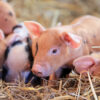
by Monica Price
Nutritional Therapist
Giving your child the best start in life starts with understanding the importance of a healthy, nutritious and varied diet.
As a new parent or with a child that’s growing up, all you want to do is make sure you are feeding your child the best foods for their development. But it can be a minefield. Often parents will tell me that their weaning babies and up to two years, will eat everything they give them with gusto and joy. But suddenly they hit age two and up – and what used to be their favourite meal will no longer be eaten – and there begins the battle with the food. Often children will be seen as fussy eaters and then every meal time becomes a challenge. This is not uncommon and you’re not alone.
Having an understanding about the types of foods that are essential for a growing child puts you as a parent back in charge, and gives you the confidence to explore a healthy and balanced diet. What you are essentially doing is laying down the foundations of healthy eating habits, that they will carry with them throughout their life.
Take control
As a parent you decide the food you buy, the meal and snack times, and how much food you give them. My golden rule is to only buy the nutritious foods. If the sugary highly processed foods are not in the fridge or cupboard – then they are not there to eat. This is so important for a baby and up to five years, because of the need for essential vitamins and minerals to aid their growth and development. As your child gets older involve them in cooking and meal times and this will encourage them to try new recipes and ideas. Make sure you are not giving your child too much food on their plate, take control of the portion sizes, it’s not the same as an adult portion – it’s a lot smaller than you think! Whilst at university I was taught an excellent way of judging what is a child’s food portion. Simply cup the child’s hand, and what fits inside their palm, is a portion. If you do this, you will find that they will most likely eat everything on the plate. Overfeeding your child can lead to childhood obesity, which in turn significantly increases the risk of heart disease, strokes, high blood pressure and diabetes in later life.
Be a role model
Be a role model for your children and eat a healthy varied diet yourself. Have a fruit bowl on the table, offer healthy snacks of vegetables and drink plenty of water. If you can eat at the table together as a family then do, and make meal times as stress free as you can. I know this can be difficult, but if you have taken control of the food that you are buying, then you are less likely to have problems. Food is often used as a reward for children, so try and give praise and hugs instead of offering food. This will help you as they become older not to see food as a tool to get what they want.
Foods for a growing child
Children grow fast and from the ages of two to twelve need the right sources of protein, calcium, iron, vitamins and minerals to ensure their growth and development. Without them children can develop nutritional deficiencies that could lead growth problems, obesity, tooth decay and diseases. The good news is that everything that your child needs can be found in food. So make sure that your child is having foods from all the UK’s Eatwell Guide main groups.
• Fruit and vegetables – eat five portions of these every day. Berries are packed with vitamin C and antioxidants – blueberries are particularly good. Go for the green vegetables every day, like broccoli, green beans, cabbage, kale and spinach. All contain fibre and antioxidants to support the immune and digestive system. Go for brightly coloured fruit and vegetables as these are high in beta carotene – essential for good skin and vision, growth and repair of the body tissues.
• Potatoes, bread, rice and pasta and other starchy carbohydrates. Choose wholegrain versions of these as the fibre in them aids good digestive health and prevents constipation.
• Beans, pulses, fish, eggs, meat and other proteins. Eggs are high in protein and choline – an essential nutrient that aids brain development. Whilst meat is packed with protein and iron, also excellent for brain development and function, and it supports the immune system. Fish will help build healthy bones and muscles too, particularly oily fish like salmon, tuna, mackerel and sardines, as they contain omega-3 fatty acids, which are excellent for brain, eye and nerve development.
• Dairy and alternatives. Cow’s milk, goats milk and cheese are good sources of calcium and phosphorous which are important for building bones and muscles.
• Oils and spreads – good choices are olive oil, rapeseed oil and sunflower oil.
Keeping your child active and eating healthily is the best way to ensure that they not only maintain a healthy weight, but as they grow they have an understanding of why nutrition is so important.
Monica Price is a qualified Nutritional Therapist, Writer and Broadcaster. She is the go-to expert for health and wellbeing on national television and radio stations across the UK.











